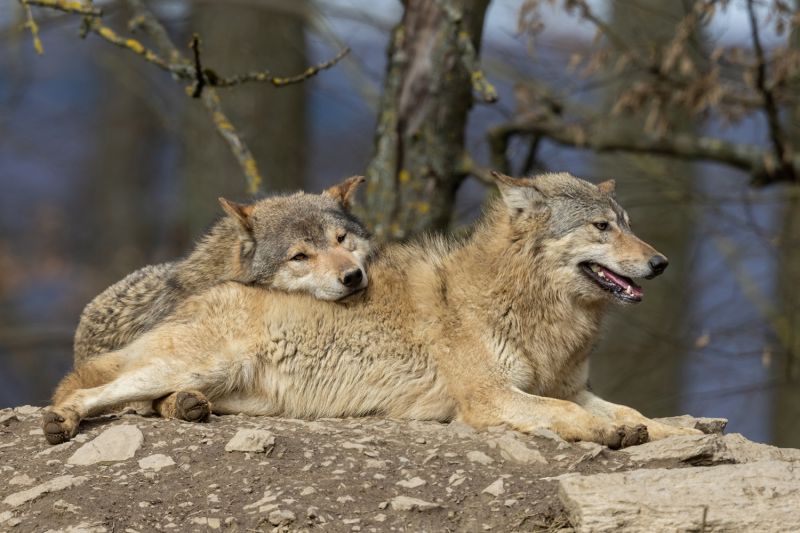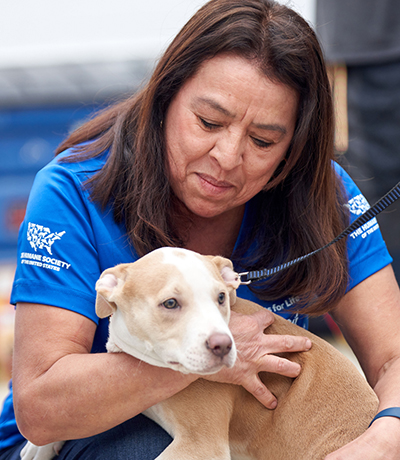Blog: Nurturing the ‘good wolf’ within
To help animals, we must consciously strive to retain our faith in people
July 25, 2024

On tough days, I often think about this well-known parable:
An elderly man is teaching his grandson about life. “A fight is going on inside me,” he said to the boy. “It is a terrible fight, and it is between two wolves. One is bad—he is anger, envy, sorrow, regret, greed, arrogance, self-pity, guilt, resentment, inferiority, lies, false pride, superiority and ego.”
“The other wolf is good—he is joy, peace, love, hope, serenity, humility, kindness, benevolence, empathy, generosity, truth, compassion and faith. The same fight is going on inside you—and inside every other person, too.”
The grandson thought about it for a minute and then asked his grandfather, “Which wolf will win?”
The old man simply replied, “The one you feed.”
Putting aside the always frustrating trope of wolves as villains, the parable reminds me that I have the power to make choices every day about which wolf I will feed. Will I give into anger and hatred? Or will I choose to remain positive and kind?
For most people this is a philosophical exercise, designed to empower us to change our mindset and choose a more positive path. It helps us recognize the internal conflict within and understand that we have control over the emotions that drive our decisions. It reminds us that as tempting as feeding the bad wolf might be, the only way to make positive changes in our lives is by feeding the good wolf.
For those of us in animal welfare, however, I’m afraid it reflects a much more tangible struggle.
We’ve come such a long way as a field from the days when judgment and ego ruled our decision-making: When we believed, for example, that those who couldn’t afford pets shouldn’t have them. When we wore the refrain “it’s easier to adopt a kid than a dog” as a badge of honor. When field officers were rewarded for impounding the most animals or writing the most citations.
Those old mindsets were easy, in part, because they fed the bad wolf, the one filled with suspicion and sure that we privileged few were the only ones who truly cared about animals. Now, thanks to extensive research and studies, our worldview has changed.

We know that more than 90% of pet owners agree with us that pets are family and that fewer than 5% of the pets in our communities are likely to wind up in our shelters. We know that intensive adoption screening doesn’t make pets any more likely to land in good homes or reduce returns, and that returns themselves aren’t failures but opportunities. We know that when offered access to services and resources, people in underserved communities take advantage of them to enhance the quality of life for their pets at the same rate as those in more affluent communities.
There’s so much evidence now that reassures us that we can lean into the good wolf when it comes to our work.
But when the dog you seized from an abusive situation comes back dying of gunshot wounds because those “wonderful” adopters gave her back to her previous owners, the bad wolf comes roaring back. When the kitten with mangled feet comes in after someone performed an at-home declaw procedure, the bad wolf comes roaring back. When people on social media hurl abuse at you and your staff, the bad wolf comes roaring back.
For all of us working or volunteering in animal shelters or rescues, the bad wolf isn’t some esoteric discussion topic: It seems to lurk around every corner, ready to pounce when we least expect it.
The bad wolf gets fed for us by every unwanted animal who comes through our doors, every cruel comment that’s hurled our way, every victim of abuse or neglect we encounter. Anguish, frustration and anger are embedded into our daily work.
For all of us working or volunteering in animal shelters or rescues, the bad wolf isn’t some esoteric discussion topic: It seems to lurk around every corner, ready to pounce when we least expect it.
Nevertheless, as hard as it is, we must find ways to keep feeding the good wolf. Because once we lose our ability to feel empathy and compassion for humans, we lose our ability to help animals.
After all, who do we need to adopt the animals in our care? People. Who do we need to show up for spay/neuter appointments and get their pets vaccinated and microchipped? People. Who provides the funding necessary for us to continue our lifesaving work? People.
Rising above the suffering we see every day and finding ways to keep showing compassion for humans is essential to our mission. But it’s never going to be easy.
The struggle is real, and not one of our own making. But the point of the parable still holds: It’s our responsibility to consciously feed the good wolf every day.
So we must keep reminding ourselves that most people care about animals as much as we do and that most people love their pets and are genuinely trying their best. We must hold onto all of the successful adoption stories and know there are thousands of pets with full bellies and warm beds because of the work we have done. We must remember the smiles on the faces of the owners reunited with their beloved lost pets and the gratitude of those who were offered help when they thought they would have to give up their pets forever.
Our compassion for animals and for humans will be tested every day in our work, but we must keep feeding the good wolf, if only to have the strength and resilience to keep the bad wolf at bay.
Learn more: Check out our resources on practicing self-care and combating compassion fatigue.

